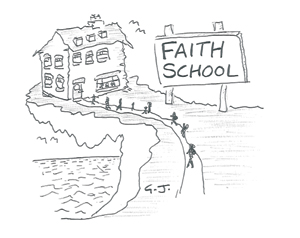
The Catholic Church's sex abuse scandals have cost it hundreds of millions in compensation and driven countless formerly loyal Catholics to abandon it for good. One thing it hasn't affected, however, is its integral role in the British education system; there are over 2,000 state-funded Catholic schools in England, most of which can select up to 100 per cent of their pupils on the basis of their parents' beliefs and discriminate against staff on religious grounds. Catholic schools, like many other faith schools, are also permitted to teach confessional religious education and provide sex and relationships education from a religious perspective.
Now Michael Gove wants the Catholic Church to have an even greater influence over English schools. The department for education has announced that it would like the Catholic Education Service to take over the running of poorly performing secular schools. In return for “sponsoring” a struggling school, the church would be given considerable influence over its curriculum, admissions policies and employment practices. To do this, the government would have to scrap strict rules that prevent faith schools forming partnerships with non-religious community schools.
At first glance, there may appear to be some merit in the idea. After all, Catholic schools are more likely to be rated by Ofsted as good or outstanding – why not apply that experience to schools that are consistently failing to meet even basic standards? But a quick glance at the DfE's official data suggests that some of the claims about the “success story” of Catholic education are overblown.
Most faith schools fail to reflect the composition of their local communities – admitting fewer poorer pupils that secular schools - but Catholic schools are particularly unrepresentative: 76% of Catholic primary schools have a more affluent mix of pupils than their immediate area. Catholic schools also tend to have a lower proportion of children with special education needs.
Contrary to some very persistent myths, the Catholic Church has remarkably little experience in supporting poor children in tough areas; the “distinctive ethos” we hear so much about is the result of faith-based admissions policies that favour pupils from wealthier and more supportive families.
But even if the Catholic Church can turn these schools around, what about the right of parents, staff and pupils to choose a secular school? Campaigners such as the British Humanist Association are concerned that Gove's plans will lead to open-to-all community schools becoming discriminatory faith schools against the wishes of the local community. The case of Village Infant School in Dagenham – a community school forced to merge with a nearby Church of England faith school, despite massive opposition for parents and teachers – shows how acrimonious such disputes can get. “Village Infants has many Christian teachers as well as atheists and Muslim teachers,” the school's outgoing head said at the time of the merger last year. “They did not choose to work in a faith school and feel compromised by being forced to do so.”
Many secularists unsurprisingly see the plans to expand the Church's role in education as a ploy to fill up emptying pews. “Whenever you have a merger of amalgamation of a faith and non-faith school, everything always leans towards the faith,” said the National Secular Society's Keith Porteous Wood, who warned that the Church's "proselytising zeal" is likely to lead to Catholicism being imposed on children, teachers and parents.
The Church, however, says the plans represent a desire to share expertise, contribute to the community and bear the “collective responsibility” of education. One way to prove their critics wrong is for the Catholic Education Service to commit to running any sponsored schools as inclusive community schools – that is, to renounce the privileges that come with faith school status. But the Catholic Church has always fought hard to retain and entrench those privileges. I can't see it stopping now.

